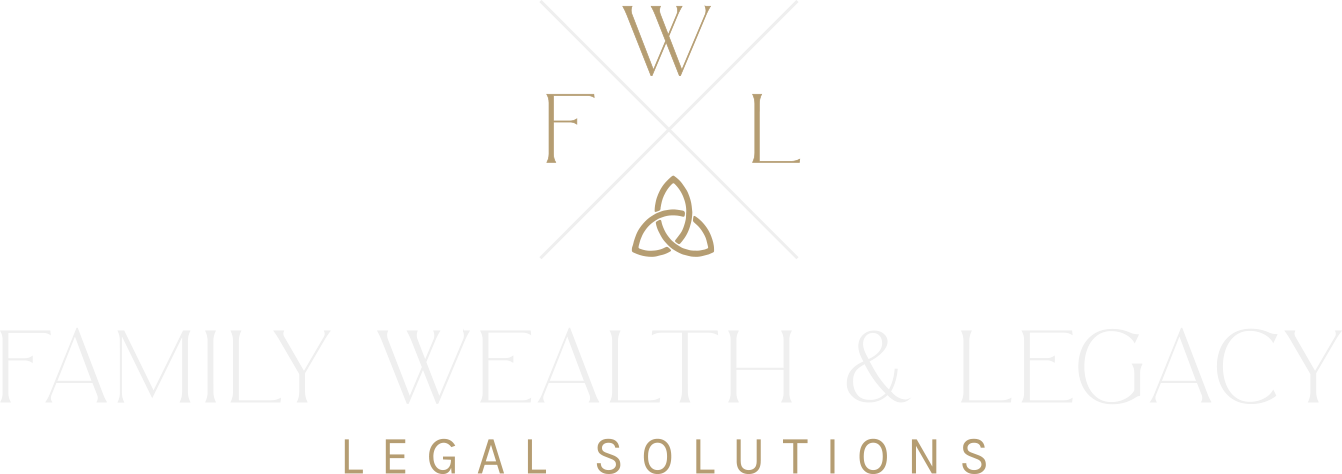Making a Trust the central piece of your estate plan is an extremely smart decision. It allows your family to avoid probate, maintain privacy, and reduce costs, expenses and delay if something should happen to you. Not only at the time of your death, but also if you ever become incapacitated due to injury, illness or deterioration of your mental capacity as you age. A Trust also allows you to choose how you want to distribute your assets to your loved ones, when they should be able to gain access and control of your assets, and to provide them with a lifetime of asset protection, if you choose it for them. Yet, here’s the thing you might not know, and is critically important to remember: simply creating a Trust is not enough and unfortunately, a majority of Trust plans fail. Let me say that again…A MAJORITY OF TRUST PLANS FAIL. For your Trust to work, it has to be funded properly and may need to be updated over time.
Over the years, as I’ve transitioned from a family law litigator attorney in court everyday fighting the good fight, to an estate planning attorney, I’ve had the opportunity of asking dozens of my friends and family about their experience in creating their Trust and reviewed their documents and plan with them. It’s astonishing, but EVERY SINGLE ONE of them did not understand their plan, what they created, or how to manage it properly. If something had happened to them before speaking with me, their plan would have failed and not worked in the way they intended. Further, NOT ONE of them properly funded their trust, or were ever educated on how to properly fund their Trust. So, let’s get into the most important step of managing your Trust.
Funding your Trust means transferring ownership of your assets from your own name into the name of your Trust. This can include bank accounts, investments, real estate, and other valuable possessions.
By funding your trust properly, you ensure your assets are managed according to the terms of your Trust and will be distributed according to your wishes when you die, or if you become incapacitated.
I don’t want to gloss over this or use any legal terms that may confuse anyone, so let’s use an example. Think about it this way, having a Trust is like owning a corporation. A corporation cannot die and therefore, does not ever need to go through probate. If the CEO of Disney dies, the company doesn’t immediately cease to exist. They simply appoint a new CEO to step into their shoes and assume the duties needed to continue running the company. A Trust is very similar, it doesn’t die and instead, contains a set of instructions on what will happen if the Trustmaker (Grantor) is unable to continue managing their own affairs or passes away.
Now, to continue this analogy, for the corporation to own and manage property, it must be owned by the company. For instance, my law firm’s financial accounts are titled in the name of my law firm, with my name on the account as the owner of the firm. I don’t own them, my company does, and I am merely the only authorized user on those accounts. If something happens to me, the operating agreement of my law firm says who is allowed to step in to manage the firm, while I am unable to do so. Therefore, like my law firm, for the corporation (your Trust) to control or properly own your home or bank accounts, you need to change who “owns” those accounts. Meaning you have to go to the bank and show them your certification trust and official paperwork to change or open accounts in the name of your Trust, just like I did when I formed my law firm.
Just so we are clear, in order for you to properly fund your trust, your statements and the title to your home should have the name of your Trust on them, with you as the trustee, just like my business accounts – my name is listed right under my law firm’s name. Further, if you don’t move ALL of your assets into the name of the Trust, or corporation for the sake of this example, then they will not help to achieve the goals of your estate plan because the Trust (or corporation) will have no control over them.
If you fail to fund your Trust, it becomes nothing more than an empty vessel and a very expensive set of documents that wasn’t worth the paper it was printed on, let alone the fee you paid for them. When something happens to you, your assets will not be protected or distributed as intended, at least partially defeating the purpose of creating a Trust in the first place! It isn’t my intention to fearmonger or to be all doom and gloom here….your assets can still get into your trust and be governed by your Trust after your death, but the only way to do so is for your family to go to court and ask a judge for permission to “fund” your trust after you’re gone. Not only is this a costly endeavor, but it defeats the entire purpose of why you created a Trust in the first place – to avoid the cost and burden of your family to have to go through court and probate.
So….to make sure your Trust works for you, as you intended when you crated it, it is imperative for you to understand how to fund your Trust properly and ensure that you can avoid probate entirely. For most of my clients, this is the primary reason and driving force behind why they created a Trust in the first place, so it is essential that you understand how to avoid these funding fiascos and work with an attorney who will ensure that everything that needs to get into your Trust, actually does. It’s unfortunate, but most attorney’s do not take the time to explain and educate their clients on how to manage their Trust after it’s signed, and they deliver their plan and fancy binder to them. It’s a transactional business model, not a relationship with a trusted advisor and after seeing dozens of my own family and friends in this same position – I’m hopeful that these simple tips can help you avoid the same mistakes…
The 5 Essential Tips Everyone Needs to Know To Properly Manage Their Trust:
1| Funding Your Trust
I think we’ve covered this above, so I won’t continue to belabor the point, but simply put…please be aware that this is the most important aspect to properly managing your Trust. Every single thing you own must be titled in the name of the Trust, a beneficiary must be designated, a joint owner must be on the account, or a payable on death beneficiary must be named – or your family will have to go through probate, even if only to transfer a small and insignificant account that is owned in your name individually, without a named beneficiary (which can be your Trust by the way).
An experienced estate planning attorney can help you develop the best strategy and combination of the above options for your assets. So, if you don’t quite understand the difference or benefits offered by the Trust owning the assets versus beneficiary designations or payable on death beneficiaries, then my advice would be to find an experienced estate planning attorney or financial advisor to work with you on developing a comprehensive strategy.
2| Forgetting to Update Your Account Beneficiaries
Many people mistakenly believe that a Will or Trust alone is enough to dictate how their financial accounts should be distributed after they die. As you now know, this isn’t the case. Without proper beneficiary designations on your accounts, your wishes may not be honored, and your assets could end up in the wrong hands.
Remember, the beneficiaries you designate on your accounts supersede any instructions in your Will or Trust, so this step is vitally important.
Take a moment to review your various accounts, such as bank accounts, retirement plans, and life insurance policies. It’s important to ensure that each account has your Trust named as your designated beneficiary, unless you’ve made different plans for that specific account.
When you are working with a lawyer, make sure your lawyer has a plan for each one of your beneficiary-designated assets, communicates that plan to you, and that the two of you decide who will handle updating your beneficiary designations. Then, make sure you review your beneficiary designations annually. In our office, we support our clients to do all of this with well-documented asset inventories, and a regular review process built into all of our plans. We also counsel our clients on the most advantageous way to handle each and every one of their accounts. For instance, retirement accounts and life insurance are very different than all of your other assets and we typically counsel our clients to name their spouse as the primary beneficiary of these accounts, and their Trust or their children’s sub-trusts as the secondary beneficiary to take full advantage of the benefits under federal law and the tax code.
3| Move Your Home Into Your Trust
For many of us, our home is our most important and valuable asset. But if your attorney doesn’t deed your home into your Trust, your home won’t be included under the terms of your Trust if you become incapacitated or pass away.
That means your home could end up going through the long and expensive probate court process in order to be managed during an illness or passed on to your loved ones after you pass away. If you own a $300,000 home, that means your family could lose up to $15,000 or more just to transfer your home to your trust and then distribute your home pursuant to the terms of the trust – and that’s not including any other assets that would have to go through probate.
A knowledgeable estate planning attorney shouldn’t miss this step, but it happens. And if you’re using a DIY service online to create a Trust without the help of any attorney at all, it’s bound to happen!
That’s why it’s so important to work with a lawyer who takes the time to make sure every asset you own is in your Trust before they bid you ado. Unfortunately, this isn’t always the case. Earlier this year, I was reviewing my parents’ estate plan that was done years ago by an attorney in the state in which they live and prior to my transition into estate planning, and I had to break the bad news to them that their attorney did not move their house into the name of the Trust. They swore to me that he had and argued with me about it. I had to show them their local clerk’s online records and title to their home in order to prove to them that he had not, even though it was discussed and they paid him in order to do so several years ago.
So, it happened to my family – make sure it doesn’t happen to yours.
4| Not Reviewing Your Plan and Accounts Every Three Years
You might wonder how not reviewing your estate plan every few years could really make your plan worthless. Well, the good news is that failing to review your plan is unlikely to completely eliminate the benefits because an estate plan is made up of a number of moving parts, not just a Will or a Trust.
But, failing to keep your financial assets up to date and aligned with your estate plan can result in huge issues for you and your family and can even make the Trust you invested in worth less than the paper it’s printed on!
That’s because your Trust can’t control any assets that don’t have the Trust listed as the owner or beneficiary. By reviewing your accounts every 3 years, you can help catch any accounts that don’t have your Trust listed in this way.
For example, it’s very common for clients to open a new bank account and forget to open the account in the name of their Trust or add their Trust as a beneficiary. Not to mention, it’s common for families to sell and buy a new home as their family grows, or they become empty nesters and downsize.
That’s why our firm meets with our clients FOR FREE every three years, just to check in and make sure that their plan will work for their family when they need it most. Thankfully, in a short meeting with my clients’ where we review their financial accounts and estate plan at least every 3 years, I’m able to catch simple oversights like this that could cause their assets to be completely left out of their Trust.
5| Make Sure All of Your Assets Are Included In Your Plan with Help From Your Personal Family Wealth & Legacy Lawyer™
Getting your legal documents in place is an important step, but it’s equally important to know that the documents themselves are not magic solutions. Merely creating a Trust or naming beneficiaries on your accounts does not guarantee that your wishes will be carried out unless all the pieces of your plan are coordinated to work together.
If you aren’t experienced in the area of estate planning, trying to coordinate all these pieces yourself can be a recipe for disaster.
That’s why we work closely with our clients to not only create their estate planning documents, but to create a comprehensive plan that accounts for all of your assets and how each one needs to be titled to make sure your plan works for you the way you intended.
Plus, we offer our clients a free review of their plans and financial accounts every three years to ensure that their plans accurately reflect their lives and their wishes for their assets and loved ones. In our experience, people believe that estate planning is a one-time thing and a set-it-and-forget-it task. That can’t be farther from the truth because your family is going to grow, your wealth will ebb and flow, go up and down, your friends, family and relationships will evolve over time – it’s extremely important that your estate plan grows, expands and evolves with your life and family over time as well. What you own today and the people you trust and rely on the most, will most likely change 20 years from now and experience tells us that most of the plans we review that were prepared by other attorneys are extremely outdated. Not to mention, the laws and the tax code will be drastically different over time as well and your plan must be updated to comply and take full advantage of the benefits offered under the law.
If you want to know more about my process for funding your Trust and making sure nothing is ever left out of your plan, click the link below to schedule a free 15-minute discovery call. I can’t wait to hear from you.
I greatly appreciate you for taking the time to read our blog and educate yourself on important (but boring) legal issues. If you are still reading and made it to the end, please leave a comment and let us know your thoughts and your biggest takeaway. If you enjoyed it and think your family and friends could benefit, please share it on social media to spread the word.
This article is a service of Family Wealth & Legacy Legal Solutions (FWLLS). At FWLLS, we do not just draft documents; we ensure you make educated, informed and empowered decisions for yourself and the people you love. That’s why we offer a Family Wealth & Legacy Strategy Session™, during which you will get educated and begin to prepare to avoid life’s most common legal problems and get a plan in place to make the best possible choices for the people you love. You can begin by calling our office today to schedule a Family Wealth & Legacy Strategy Session and mention this article to find out how to get this $750 session at a significantly discounted rate, or even for free.


